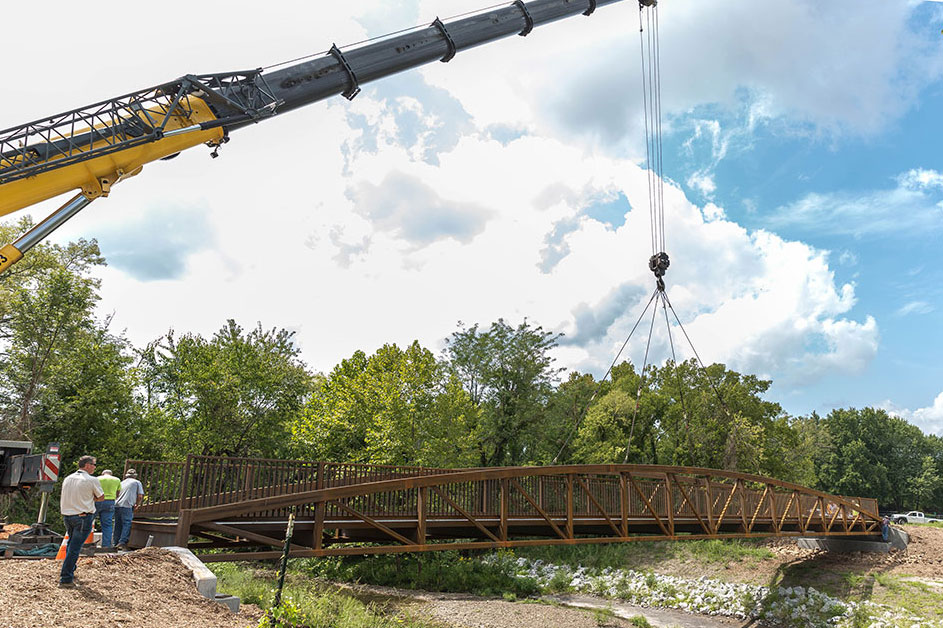
A crew in August 2017 installed a 130-foot-long bridge over Cato Springs Branch as part of a project to provide trail users with a direct route to the new Kessler Mountain Regional Park in south Fayetteville. Funding help for the project came from the Walton Family Foundation, who donated $150,000 toward design costs and $2 million in matching funds for construction of the new trail.
Photo: Todd Gill, Fayetteville Flyer
Bicycling was responsible for $137 million in benefits brought into Northwest Arkansas in 2017, according to a series of studies unveiled by the Walton Family Foundation. The figure includes $51 million in economic activity and $86 million in health benefits.
The foundation has invested heavily in cycling over the past decade, providing $74 million to help build 163 miles of soft-surface and paved bike trails across the region.
“While the energy generated by trails and paved paths is palpable across Northwest Arkansas, these findings validate cycling as a regional economic engine that supports local businesses, attracts tourists and builds healthier communities,” said Tom Walton, chair of the foundation’s Home Region Program Committee and a grandson of Walmart founder Sam Walton.
Economic and health benefits
The first study (read it here), commissioned in collaboration with PeopleForBikes, was designed to help policymakers, funders, and stakeholders understand the overall value of investing in bicycle infrastructure.
According to the findings, cycling visitors spent $27 million at local businesses in 2017. Those visitors included 90,000 mountain bike tourists who visited Washington and Benton counties at a rate comparable to some of the most notable mountain biking destinations in the country.
About 55 percent of mountain bike trail users were from outside the region last year, the study found. That’s compared to the 65 percent share of non-local riders on mountain bike trails in Bend and Oakridge (Oregon), and 49 percent in Squamish (British Columbia).

Adam Barnes, of Fayetteville, rides along one of the newest additions to the Kessler Mountain trail system in Fayetteville.
Photo courtesy of Ozark Cycling Adventures
The report also showed locals spent more than $21 million in bicycle-related equipment and events, and were responsible for $3 million in bicycle retail sales and retail sales taxes.
Residents’ cycling habits are also above the nation as a whole. According to the study, 27 percent of locals rode bikes six or more days in the last year — a rate 11 percentage points higher than the national average. That activity contributed an estimated $79 million in reduced mortality benefits identified using the World Health Organization’s Health Economic Assessment Tool model and $7 million dollars in estimated avoided health care costs.
The foundation said it will offer the study’s templates free of charge to cities and regions across the country that are interested in measuring the economic benefits of cycling by using Northwest Arkansas as a national industry model.
“Northwest Arkansas is a shining example of the positive impact cycling can have on a community,” said Steuart Walton, brother of Tom Walton. “We hope to inspire other towns and cities by sharing the lessons and impact we’ve observed, such as the importance of quality miles over quantity of miles, the proximity of trails to downtowns and advocating for female and youth cyclists.”
Northwest Arkansas trail usage
The foundation commissioned a second study (read it here) from researchers at the University of San Diego analyzing trail usage across the region to measure the impact of its 10-year investment in helping build soft-surface and paved bike trails in Northwest Arkansas.
The study showed a 24 percent increase in average annual bicycle usage from 2015 to 2017. During that time, about 34 miles of new multi-use path were constructed, along with about 77 miles of natural surface trails, 0.5 miles of bike lane, about 1 mile of neighborhood path, and 0.5 miles of shared roadway facility.
The study also noted a 10 percent increase in average annual pedestrian usage over the last two years.
Comparing cycling levels per capita, Northwest Arkansas reported higher daily cyclist trail use than bike-friendly areas like San Francisco. Similarly, the region reports more pedestrians per capita using trails than heavily populated areas like San Diego County.

The study determined the region’s trails and paved paths are being used for both practical and recreational use. For example, weekday cycling in 2017 showed a double peaking pattern, which typically means the infrastructure is being used for utilitarian reasons, such as school or work trips. Weekend cycling showed a single peak, which suggests that the usage is likely more recreational in nature. The analysis also showed that there are higher levels of cycling in areas of NWA that are more densely populated and have low-to-medium incomes.
The highest levels of trail usage use was in densely populated and low-to-medium income areas, which, according to the study is consistent with cycling trends.
Comparing NWA to peer and aspirational cities
Foundation officials said Northwest Arkansas has reaped all these positive economic, social and health benefits while still managing to keep its trail building costs lower than many areas with comparable bicycle infrastructure.
In a third study (read it here) by Alta Planning + Design, Northwest Arkansas was compared with eight peer cities as well as two aspirational cities – Austin and Minneapolis.
When placed next to other cities with popular and growing greenway trail systems, Washington and Benton counties ranked in the lower third for trail costs. Northwest Arkansas reported an average cost of $217.09 per linear foot, compared to $313.75 per linear foot in peer cities

Fayetteville leads the way when it comes to staff dedicated to trail planning, design, construction, maintenance and programming.
Fayetteville plans, designs, constructs, and maintains all its trails in-house with 11 full-time staff. The city’s approach is unique to the region, as most jurisdictions in Northwest Arkansas operate their trail programs through a combination of parks and transportation staff, averaging one to two full-time employees dedicated to trail development.
Beyond Northwest Arkansas
Outside the region, the Walton Family Foundation is supporting the development of a 30-mile expansion of the Big River Trail in the Arkansas Delta, according to a news release.
The Walton brothers have also provided grant funding for trail building initiatives, including a 16-mile natural-surface trail system in Hot Springs, a bike and skate park in Fort Smith, mountain biking and hiking trails in Eureka Springs, and a 12-mile natural-surface trail system at Camp Orr on the Buffalo River.
They have also provided funding for a maintenance program for the state’s designated International Mountain Biking Association (IMBA) Epic Trails to help keep the trails in good enough shape for year-round riding. Because of that investment, Arkansas is now the only state in the country with a professional trail maintenance crew.



